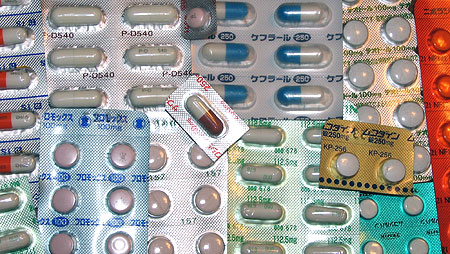Pills, Capsules, Powder

When I first came to live in Japan, I was in Toyama City, up near Niigata, on the Japan Sea coast. As usually happens, I fell ill enough to see the doctor from time to time. One time it was for ringing in my ears. I went to see the doctor, and after a short examination, he gave me three types of medicine: pills, capsules, and bags of powder to be taken with water. Some time later, I had a stomach illness. The doctor examined me, then gave me three types of medicine: pills, capsules, and bags of powder to be taken with water. Later still, I suffered from headaches. Guess what the doctor gave me?
It began to be a bit of a joke, and the beginning of my lack of respect for doctors in Japan. All the medicines looked alike, and I kind of doubted that all three of those maladies really would require so similar a course of the exact same types of medicines. And if the doctors were just trying to placebo me into feeling well, wouldn’t a single medicine suffice?
Of course, this was before I found out more about how the insurance system works. It has set fees for medical treatments, and doctors find ways to milk this for all it’s worth. That’s why a dentist once scheduled me for four appointments to have my teeth cleaned–lower left teeth one visit, lower right the next, and so on. Another dentist did root canal on me, and did it over twelve appointments–again, dividing the visits into tiny tasks. The insurance, it turns out, pays more for multiple visits. How nice–waste my time and make unnecessary alterations to my medical treatment to get a few more bucks here and there.
It’s the same thing with drugs. Each hospital has a pharmacy across the street or somewhere very near, and that’s where they send you to buy your drugs. It also is usually a business which the doctors either co-own or get kickbacks from. So people get rather over-medicated quite often. Thus the rather large assortment of pills, pictured at top, turned up when I was cleaning out my cabinets and drawers last weekend.
Another disadvantage is that you get them in the blister-pack form, and usually only with directions for taking them. What you do not get is drug names or explanations of what each one is for, unless you ask the doctor when s/he prescribes them. I prefer the orange-brown-bottle-with-the-white-childproof-cap system where it says the name of the drug and what it’s for. And don’t expect drug names to be the same, especially not the brand names printed on the packing. The doctor can be helpful there, though–which is how I found out that one drug I was prescribed was none other than Rohypnol, which I had heard mentioned in news stories and TV dramas as the date-rape drug. Kind of startled me at the time.
Your best bet: either find a doctor you can trust (not always easy, especially to find one nearby enough to be convenient), or ask your doctor if those medications are really necessary, and which ones could you perhaps do without?

That’s rough that you’ve visited such sketchy clinics. I’ve heard that some doctors will try to play the system like that to make more money, but I don’t think it’s all that widespread. I’ve never had any experience like that, nor has my extended family, and we’ve visited various clinics a lot and I’ve had a major surgery while I was in Japan.
Like it is with a lot of things, research pays off here. If you search on the internet in Japanese, you can find tons of information about different doctors and clinics in message boards, ratings sites, even blogs. There are rating systems and recommendations for hundreds of clinics just in the extended Tokyo area. People who can’t read Japanese that well might ask a friend to help them do a little research before visiting the doctor. That’s the beauty of the Japansee medical system, you can go to any hospital, no matter how famous or well known. So if you are every having a major procedure (and live near Tokyo or a large city) do some research and go to the most resepected hospital with specialists in that field. They probably speak English as well. When we’ve taken my son to the hospital here, I was surprised at how many doctors are fluent in English after having done post-doctoral work in the States or Europe.
Granted, the pill-capsule-powder quacks were mostly in Toyama, but the multiple-visit dentists are everywhere; I’ve had several myself and found a good clinic (Nishibori) in Tokyo that doesn’t do that, but I’ve experienced it a lot elsewhere and know many people with the same experiences. And yes, it is an excellent idea to research which doctors and clinics have the best service. One clue: American medical training. Especially with the dentists, but I find it helps with the regular docs too. I think the level of medical training is better from the US than it is from Japanese schools, and as an added bonus, the docs will be able to speak English.